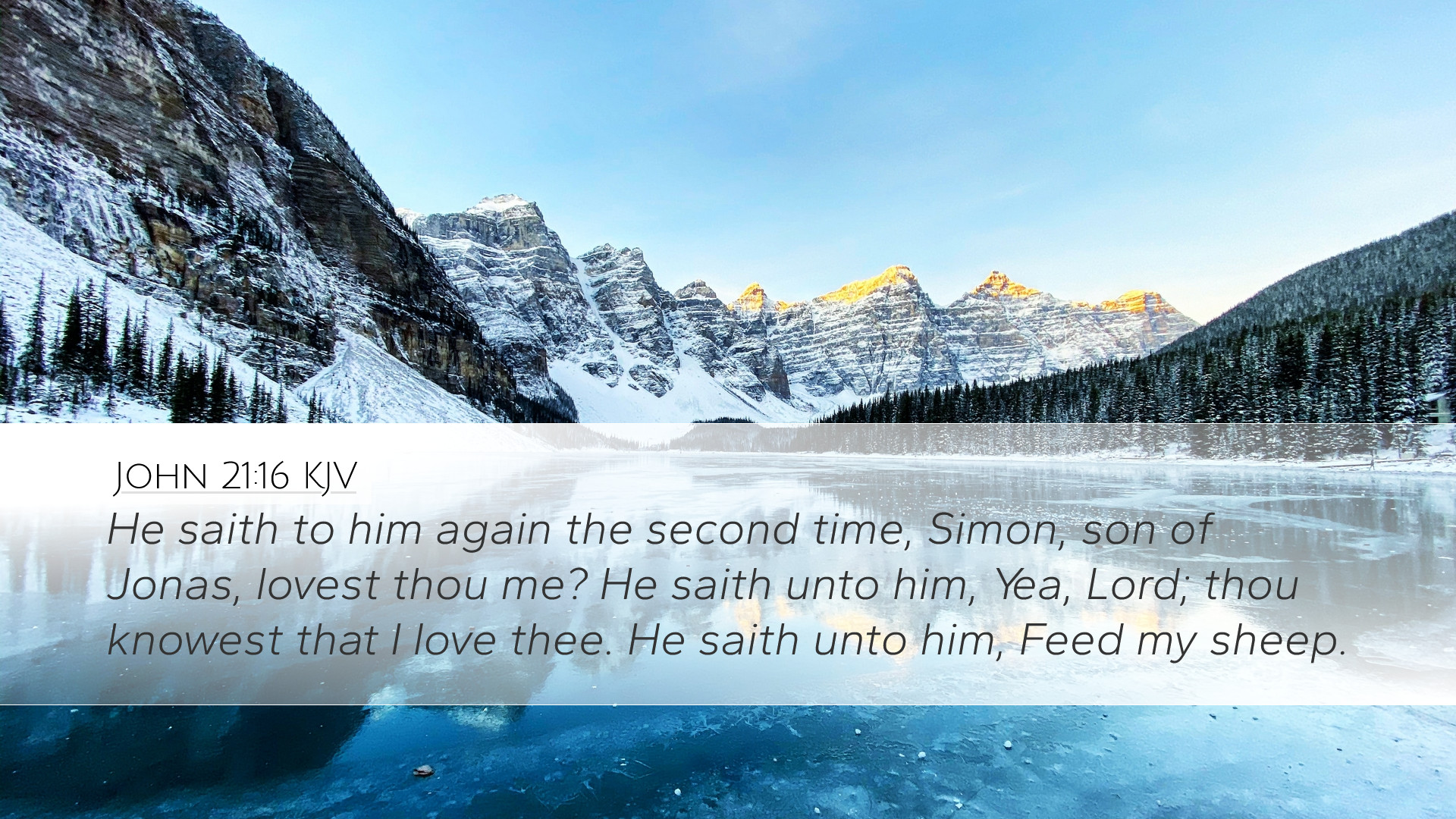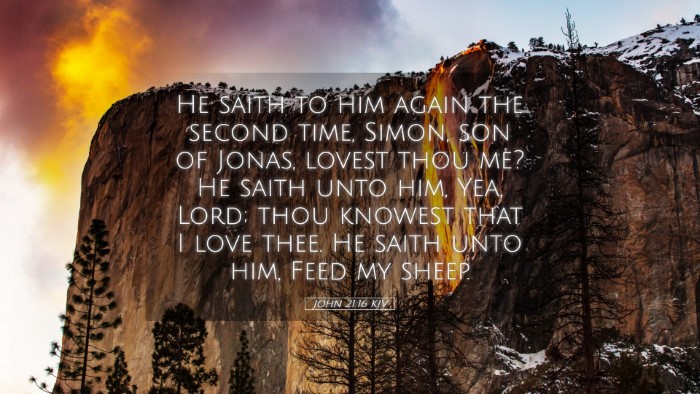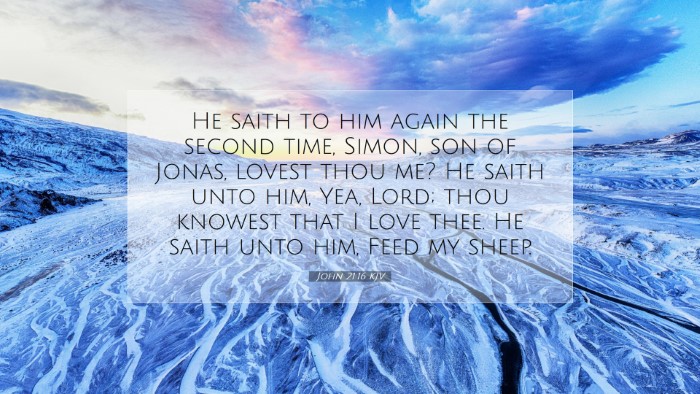Old Testament
Genesis Exodus Leviticus Numbers Deuteronomy Joshua Judges Ruth 1 Samuel 2 Samuel 1 Kings 2 Kings 1 Chronicles 2 Chronicles Ezra Nehemiah Esther Job Psalms Proverbs Ecclesiastes Song of Solomon Isaiah Jeremiah Lamentations Ezekiel Daniel Hosea Joel Amos Obadiah Jonah Micah Nahum Habakkuk Zephaniah Haggai Zechariah MalachiJohn 21:16
John 21:16 KJV
He saith to him again the second time, Simon, son of Jonas, lovest thou me? He saith unto him, Yea, Lord; thou knowest that I love thee. He saith unto him, Feed my sheep.
John 21:16 Bible Commentary
Commentary on John 21:16
John 21:16 states:
“He said to him again a second time, 'Simon, son of John, do you love Me?' He said to Him, 'Yes, Lord; You know that I love You.' He said to him, 'Shepherd My sheep.'”
Context and Significance
This verse is part of the post-resurrection appearance of Jesus to His disciples at the Sea of Tiberias. The dialogue between Jesus and Peter serves as a pivotal moment, both for Peter's restoration and for the commissioning of the apostles. This passage is rich in theological implications and pastoral applications, and it emphasizes the central importance of love in the relationship between the shepherd and his flock.
Analysis of Key Elements
1. The Question of Love
Jesus’ question, “Do you love Me?” signifies an invitation to intimate self-examination. The repetition of this question not only addresses Peter’s three-fold denial but also indicates the necessity for reaffirmation of commitment. According to Matthew Henry, this inquiry is designed to challenge our understanding of true love for Christ and orchestrates a deeper communion with Him.
2. Peter's Response
Peter’s affirmative response, “Yes, Lord; You know that I love You,” carries significant weight. Albert Barnes comments that Peter’s defensive posture in his earlier denials contrasts with his now humble acknowledgment of love. This shows an essential transformation in Peter characterized by a deepened awareness of his relationship with Christ post-resurrection.
3. The Call to Shepherd
The command, “Shepherd My sheep,” encapsulates the pastoral responsibility entrusted to Peter. Adam Clarke notes that this metaphor underscores the leader's role in nurturing and guiding the congregation. It is essential for pastors and church leaders to recognize that loving the Lord necessitates a commitment to service in leading His people. This creates a sacred bond between love for Christ and care for His flock.
Thematic Insights
1. Restoration through Love
This passage beautifully illustrates the theme of restoration. After denying Christ, Peter receives a chance for reconciliation. As Matthew Henry remarks, this dialogue shows that no matter the gravity of our failures, Christ stands ready to forgive and reinstate us into His service. This is a powerful message for any who feel that they have fallen too far to be restored.
2. The Nature of True Discipleship
Discipleship is intrinsically tied to love. Jesus' pastoral call implies that genuine love for Him translates into action towards others. Albert Barnes elaborates that love must manifest in obedience and service, which entails a holistic approach to ministry that encompasses care for both spiritual and physical needs of others.
3. The Role of the Shepherd
The imagery of shepherding evokes a sense of responsibility and vigilance. As Adam Clarke explains, shepherding involves not just leading, but also protecting, providing, and nurturing the flock. This is particularly significant in theological education and pastoral training, where leaders must be equipped to fulfill these roles effectively.
Applications for Ministry
For pastors and church leaders, this passage offers profound challenges and applications:
- Introspection and Repentance: Leaders must routinely assess their love for Christ and maintain a posture of humility before Him.
- Commitment to the Flock: A commitment to serve effectively and compassionately should be at the forefront of pastoral duties.
- Emulating Christ’s Love: Pastors should look to Christ's model of love as the foundation for their relationships with their congregations.
- Encouraging Restoration: Just as Peter was restored, leaders should create environments that encourage healing and welcome back those who have strayed.
Conclusion
In summary, John 21:16 serves as a poignant reminder of the intertwining of love, responsibility, and restoration in the Christian life. The interplay of Jesus’ questions and Peter’s responses encapsulates the heart of discipleship, urging each believer to consider how their love for Christ compels them to shepherd others. This verse is a call to deeper engagement with God and an invitation to serve effectively within the community of faith.


